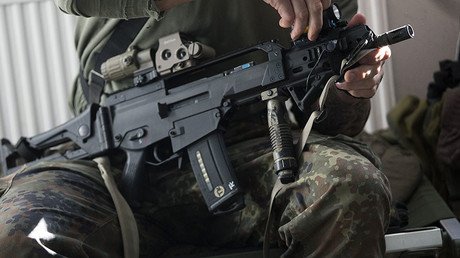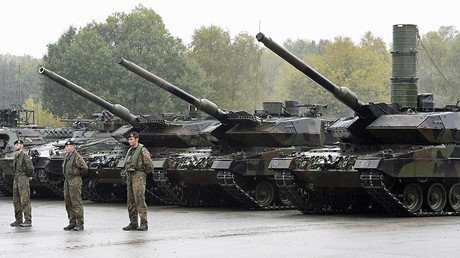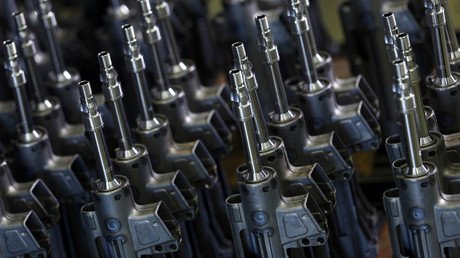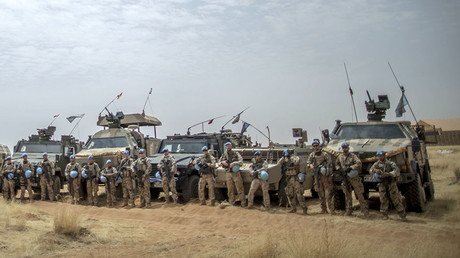German politicians decry arms sales to Turkey amid ongoing operation against Syrian Kurds
German politicians have widely opposed plans to provide Turkey with tank modernization upgrades after Leopard 2 combat vehicles were spotted taking part in the military operation against the Kurds in Syria’s Afrin.
Amid rumors of potential resumption of arms sales to Turkey, German opposition parties, the Greens and the Left, urged the government to reconsider such deals with Ankara, pointing out that German weapons are now killing innocent people in Syria.
“An immediate halt to all arms exports to Turkey is long overdue,” Agnieszka Brugger, a Greens lawmaker told the Heilbronner Stimme newspaper. “This intense situation should be a wake-up call for the German government.”
Since the 1980s Germany has sold Turkey some 751 Leopard tanks, including 354 modern Leopard 2 type, which has been previously used by Turkey an a cross border operation against Islamic State (IS, formerly ISIS/ISIL) terrorists and US-supported Kurdish militias in Syria.
Throughout its military campaign in the neighboring country, Turkey lost a number of 60-ton Leopard 2 tanks, built by Bavaria’s Krauss-Maffei, due to mine explosions. Ankara has recently pressed Berlin and German arms companies to retrofit the hardware to offer better protection against enemy mines.
The tanks used by Turkey come from decommissioned stocks of the Bundeswehr. The frontal armor on the hull and turret on the Leopard 2 is much thicker than on the sides and rear of the tracked vehicle. Potential German arms sales to Ankara, including the upgrades of Turkey’s Leopard battle tanks, were allegedly discussed earlier this month when Turkish Foreign Minister Mevlut Cavusoglu met with his German counterpart Sigmar Gabriel in Goslar, Germany, Der Spiegel reported last week.
“There must be no retrofitting of Turkish tanks by Rheinmetall [armor manufacturer],” added Green Party chief Simone Peter. “Other cooperation at the military level, on defense level, should be immediately stopped.”
Even a member of Chancellor Angela Merkel's Christian Democratic Union (CDU) party and chairman of the parliamentary foreign affairs committee, Norbert Röttgen, noted that it is “completely obvious” that Germany should not provide the tank upgrades to Turkey, and described the Turkish intervention in Syria as “clearly contrary to international law.”
The massive outcry from the German politicians was caused by the publication of pictures which allegedly showed German tanks used against the Kurds in Syria. An expert from the Bundeswehr confirmed to the German Press Agency in Berlin on Monday that pictures, distributed by the state-owned Anadolu Turkish news agency, showed Leopard 2 A4 tanks of German production. “Apart from the images from the media that you all know, we have no information on the use of Leopard tanks,” a spokesman dealing with weapons exports in the economy ministry said in a statement.
“Angela Merkel must explain her Turkey policy,” said Jan Korte, an MP from the Left. He noted that German soldiers are directly involved in the war of aggression against the Kurds by flying Boeing E-3A Airborne Warning & Control System (AWACS) aircraft missions and not doing anything to stop the bloodshed on the ground.
Free Democratic Party (FDP) MP Graf Alexander Lambsdorff also expressed sharp criticism of the Turkish action against the Kurds in Syria. “This invasion is not legitimized by international law. There is no mandate from the United Nations and it is not self-defense. All states should call on Turkey to end the campaign and ask them to work on a political solution instead.”
Despite the opposition to the Turkish campaign, Germany has so far failed to condemn the 'Olive Branch' operation. Instead, Gabriel expressed his “concern” during a phone call with Cavusoglu on Monday, while calling for a political solution of the crisis.
Watch Turkey fire rockets on Kurdish-held targets in Afrin, Syria as Operation ‘Olive Branch’ gets underwayREAD MORE: https://t.co/9kt8ngb5Zmpic.twitter.com/n6CxGhd4xk
— RT (@RT_com) January 23, 2018
Turkey launched 'Operation Olive Branch' against the Syrian Kurdish People’s Protection Units (YPG/YPJ) Saturday, following the announcement that the US-led coalition in Syria would create a “border security force” to prevent IS from regrouping in Syria. Ankara sees the Syrian Kurds as an extension of its domestic nemesis, the Kurdistan Workers Party (PKK), and considers their presence on its borders as a national security threat. To eliminate this menace, Turkey with the help of the Free Syrian Army (FSA) aims to create 30-kilometer deep “safe zone” in Syria’s Afrin. At least 260 Kurdish fighters and Islamic State (IS, formerly ISIS/ISIL) terrorists have so far been “neutralized” in Syria, Turkish General Staff said Tuesday.
READ MORE: Iraqi Kurds ready to support ‘sacred resistance’ against Turkey if ‘allowed’
It is no surprize to Germans that weapons offered to Ankara will be used in a cross-border military operation that is “illegal under international law,” weapons expert and publicist Jürgen Grässlin told RT, noting that the Turks used German made weapons against the Kurds for decades in the southeast of their own country.
France calls for UNSC meeting on Turkish operation in Afrin https://t.co/Q7xKVm3C8dpic.twitter.com/TpynRBypF6
— RT (@RT_com) January 21, 2018
“It was a great, great mistake of the German government to deliver these small arms and major weapons to the Turkish army. It is no sensation. Everybody knows that German weapons could be used not in the civil war in Turkey but also in a war between Turkey and the Kurdish people in Syria,” Grässlin said. “So it is no surprize that the Turkish army used those weapons, first beginning in the ‘80s against the Kurdish people in the southeast of the country, and now against Kurdish people in northern Syria.”
















